Advice for young sports broadcasters - Part 1
From an old sports broadcaster with a young head.
This is Part 1 of several in a series. It’s a very inside look at what goes on inside the world of Sports Broadcasting. I’m opening the vault with hopes that young broadcasters can get real information about what goes on, how to get in and stay in, and how to navigate the challenges of a rapidly changing industry.
This is a very tough business - you should know about it. It can be brutal and shitty, and filled with internal and external politics. Good people and very bad ones.
But this is also a business that’s rapidly changing with opportunities at every bend and turn, especially for young broadcasters with new skills.
I’ve always had a passion for helping, teaching, and mentoring young broadcasters and that still drives me.
I'm not pulling any punches here. You’ll get it all. You’ll be better equipped to handle the mine field waiting for you out there.
I’ll do this in several installments. Please ask me questions. Please pass this on to anyone starting out in the field - or anyone looking for general advice and inside dope on what it’s like and what you’ll need to do.
Let’s roll.
Who am I?
Quick Bio
I’ve worked in sports broadcasting for over 40 years, 30 or so of those as an NHL broadcaster. For 25 seasons (and over 2000 broadcasts) I was with the Dallas Stars (Minnesota North Stars), calling the franchise’s biggest moments. For national and international TV and Radio carriers I worked the 2019 NHL Global Series, the 2018 Winter Olympics in South Korea, 4 Winter Classics, and 4 Stadium Series games as well as regular work calling NHL playoffs and playoff series.
I’ve also called every sport you can think of. I was the last play-by-play guy for the American Wrestling Association. I did 2 seasons of Women’s professional volleyball. I called major college football, college basketball, and even professional body building.
Today, the first 2 topics in the lesson and ongoing instruction.
1. ALWAYS SAY YES
This is CRUCIAL to getting in and moving up. No matter what the gig, or what the sport, or what entity is hiring, or what your level of knowledge about the sport is - SAY YES!
Remember this - I can’t always predict what happen if you say YES - but I can guarantee what happens if you say no -
That road closes. Maybe permanently. A person you might meet there who will help you later in life is eliminated from your network. A sport you never thought you wanted to call might become your livelihood. Just auditioning or going to a meeting might open up doors you can’t possibly comprehend at that moment.
I’ve always done this, and here’s maybe the best example.
It’s 1988 and I’m building. I take every cable TV or small market radio sports broadcasting opportunity I can scrounge up. In those days it was get out the yellow pages, make the phone call. Go to the cable TV station and talk them into putting me on the air.
One day I get a phone call from a talent booker who I found in the yellow pages who helped me get a couple of Ford Motor Company TV voice-over commercials in Western Canada. I know. Weird. I did them in a studio in Minneapolis.
She calls me weeks later and says she’s got this open audition call letter for a new TV broadcaster for the AWA (American Wrestling Association) and since I’m a sportscaster - would I be interested?
YES!!!!!
Despite the fact that I grew up in the birthplace of Professional Wrestling, and that I would occasionally catch a few minutes of their show, I wasn’t a wrestling fan. I didn’t know a damned thing about it really other than the AWA used to have local wrestlers Hulk Hogan, Jesse Ventura, and Rick Flair on the payroll until they all bolted for a better payday and a bigger audience.
Now the AWA was on its last legs and they were looking for new, young, energetic. And I was all those things.
I went to the audition and got it. We shot the pilot in a Strip Joint - no kidding - where the manager asked me if I was interested in part time work as a DJ - sort of - on weekends. I said YES to that too - although that was very short lived - I didn’t like the work there.
Long story short - THE VERY FIRST PROFESSIONAL WRESTLING MATCH I SAW IN PERSON - I WAS THE ANALYST FOR THEIR ESPN SHOW.
I got daily practice in studio doing taped segments and interviews. I called matches live and off the monitor. It became a real broadcasting bootcamp, and they paid me to do it for almost 2 years. It was essential to my career development and I owe Verne and Greg Gagne for that.
I said YES when Group W Cable asked me if I could do girls High School Volleyball - even though I had never called the sport. That turned into calling the Minnesota State Volleyball Tournament, which turned into calling USA - CUBA mens Volleyball at Met Center - and that turned into a two year hitch calling Women’s professional volleyball.
And one day a guy I knew called me and said he heard somebody named Norm Green had just purchased the North Stars and they were looking for a radio host, analyst. I was a PXP guy but I SAID YES and the rest is history.
ALWAYS SAY YES.
2. NOTHING GETS DONE YOU DON’T PUSH - BE RELENTLESS
This is especially true today. I wish it wasn’t this way but it is - you gotta grab people by the throat to even get em to pay a little bit of attention to you. You see this in your daily life. Everywhere.
If you’re not willing to go through walls - to make yourself seen and noticed - to follow up - follow up again - and follow up some more - you’re not long for this career or any other.
I’m a bulldozer. All gas no breaks. I don’t apologize for it - I wear it as a badge. I try the front door, the back door, the side door, and if necessary I’ll scale a tree and kick out a window just to get in and get noticed.
RISK BEING A PEST - YOU DON’T HAVE MUCH OF A CHANCE OTHERWISE.
Wanna know how I got the Stars gig? I bugged the shit out of them and used everything I had at the time. Here it is -
My friend (former North Stars defenseman Dan Mandich) called me one day and said - “Some guy named Norm Green bought the North Stars and KSTP radio called me and wants to know if I’m interested in being a radio analyst and host - I’m gonna go through the process but I don’t think I’m the guy - but maybe you are”
I get over it’s not the PXP spot - and that I’m not an ex player pretty quickly and decide - YES - let’s give this a shot.
Nobody in town knew Norm. My attorney father Ralph Sr had done some legal work for the old owners - but that didn’t do me any good.
But KSTP Radio I knew of - even though I didn’t know anyone in there. I had my sister pose as my assistant on the phone and she contacted the station and asked how she could get the audition setup for local cable hockey PXP veteran Ralph Strangis (I had called hundreds of hockey games - small college and high school for about 5 years.)
They said “Who?” I sent them a resume and a tape anyway.
Try it again. I got the North Stars offices and was able to send a letter and tape to Norm Green. To this day I don’t know if he got it.
I called everyone I knew in the business. I tried every angle. This was gonna be tough.
It did so happen that my family - my Dad - knew Walter Bush, former President of USA hockey and a real fixture in the Minnesota hockey scene. Look - USE EVERY CONNECTION - NO MATTER HOW REMOTE WHEN TRYING TO GET THROUGH THE DOOR.
I got Walter on the phone and he said - “I can at least call KSTP and get them to look at your resume and tape.”
He did. I followed up right away with Station Manager Ginny Hubbard Morris. I had never met her until I got her on the phone. I’m a good salesman and I pushed hard after hearing the bad news.
“Well - we already have the 3 candidates we’re interested in but if something changes I’ll let you know.”
I sent her and the North Stars thank you notes. I kept calling friends. I kept pushing. I called Ginny again - we had pretty good chemistry on the first call. Why not - let’s keep going.
“OK - I’ll tell ya what. We’re going to do an audition into a tape recorder with our guys at a Stars practice. We have Bob Paradise (former Stars player) and he’ll do one period with Al (Al Shaver, the only radio PXP man the North Stars ever had), Dan Stoneking, a local newspaper hockey writer will get another full period, and Dan Mandich is fine to do one half of a period and we’ll give you the other half.”
Are you shitting me??? I’m in!!
I called more people and found the Stars equipment manager who helped me with notes and background - there was no internet and very little info available.
We all show up at the practice scrimmage and Bob Gainey doesn’t put numbers on the practice jerseys. Audition cancelled.
I call Ginny later that day and she says - “the team is going to Russia for an exhibition series - when they get back we’ll revisit - but we may just go with one of those guys.”
I send her another thank you letter - and I send Norm another letter. I don’t know if Norm ever sees any of this but I don’t care. I gotta do my part. I’m not gonna be the reason I don’t get this.
The Stars come back and begin their preseason schedule without a radio host and analyst. They decide they’re going to do one more audition into a tape recorder. In St. Cloud, Minnesota, at the new building. Ginny calls me and says - OK - you’re on again.
We all get in a van and make the drive together.
When we get to the press box - there are 3 place cards on the row - they read:
AL SHAVER.
NORTH STARS COLOR AUDITION.
JOHN SCHROEDER, SPORTS DIRECTOR WJON ST. CLOUD
I knew he’d be there but didn’t know he’d be sitting right next to me. John Schroeder and I went to elementary school together and called student athletic games into tape recorders. We both were so into this. And here he is. I felt pretty good about the omen.
The radio producers asks us who wants to do the pregame interview with Bob Gainey. My hand shoots up. He takes me. He finds out quickly I know how to do it - how to take it and tag it - I’m a broadcaster. The other guys have no broadcasting experience. It goes really well.
My half period came and I was ready. Prepped. Schroeder gave me additional information about the new building. Tempered glass, new construction methods, etc.
I had listened to Al so closely over the years and I knew how he liked to call a game and what he expected out of his analyst. I gave it to him.
The next day Ginny called me and said:
“So - we think you’re the guy. Pending Norm’s approval after an on-air audition for the Stars - Blackhawks pre season radio game Saturday - it’s your job.”
HOLY SHIT!!!!
I prepped hard and was ready. Prior to the game Norm Green came over and introduced himself to me. He said:
“Nervous??”
I said:
“Oh no - I’m excited.”
He smiled and walked away.
The game went well. Al and I had good chemistry right away.
The next morning Ginny called me and said -
“Congratulations - Norm loved it - you’re our new radio host and analyst for the season.”
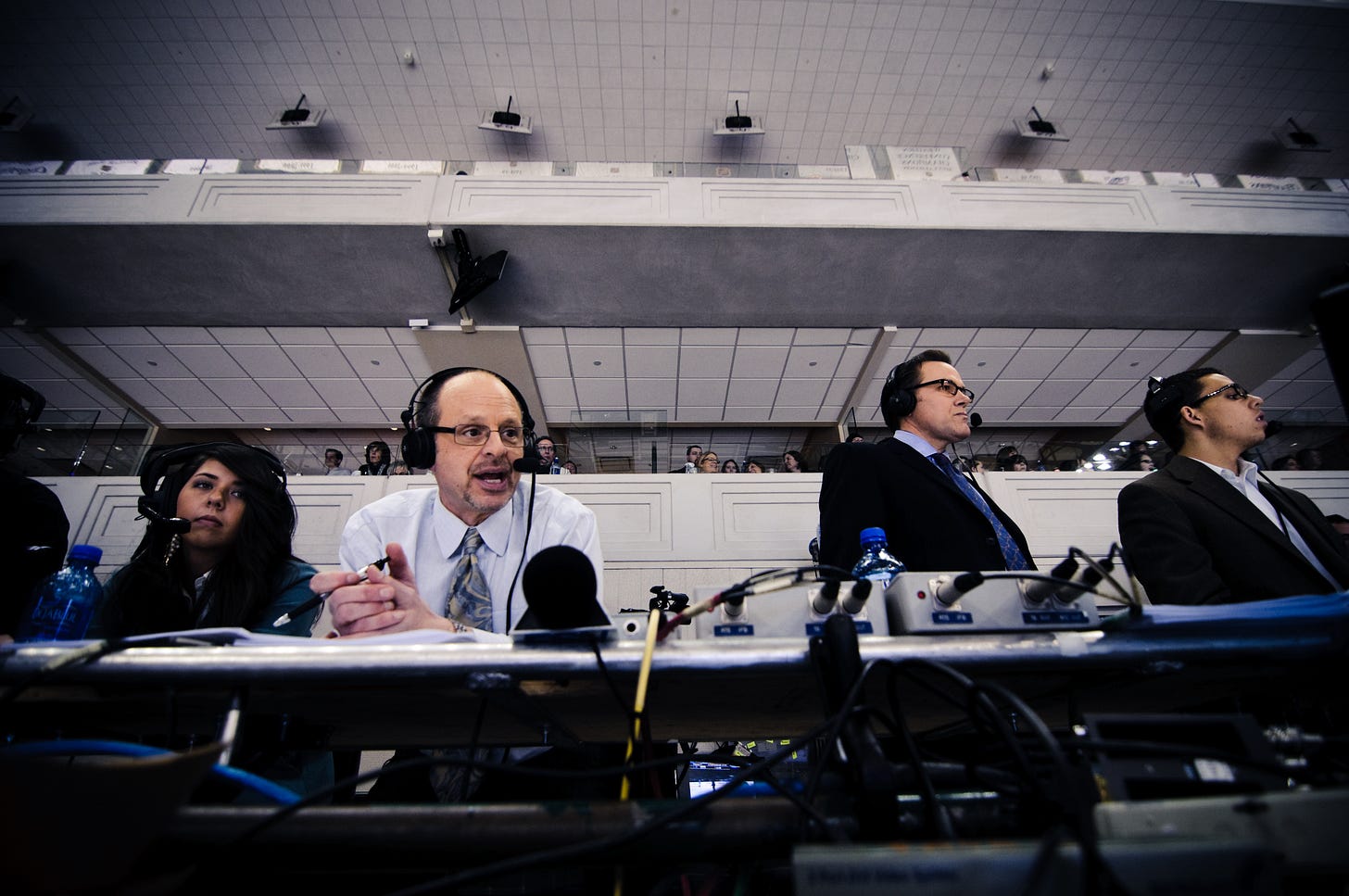
SUMMARY
These two are foundational pillars of success for anything you’re doing or any career you’re interested in - but especially this business of Sports Broadcasting.
1. SAY YES
2. PUSH HARD
Please send me questions - and spread the word - I’ll communicate with any young broadcaster who wants my advice.
CONTINUE READING…

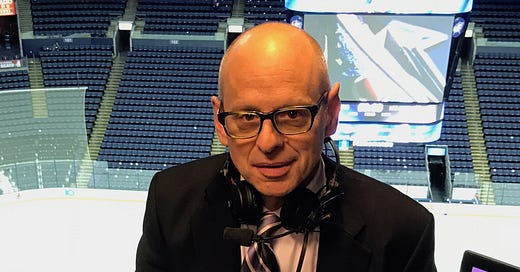



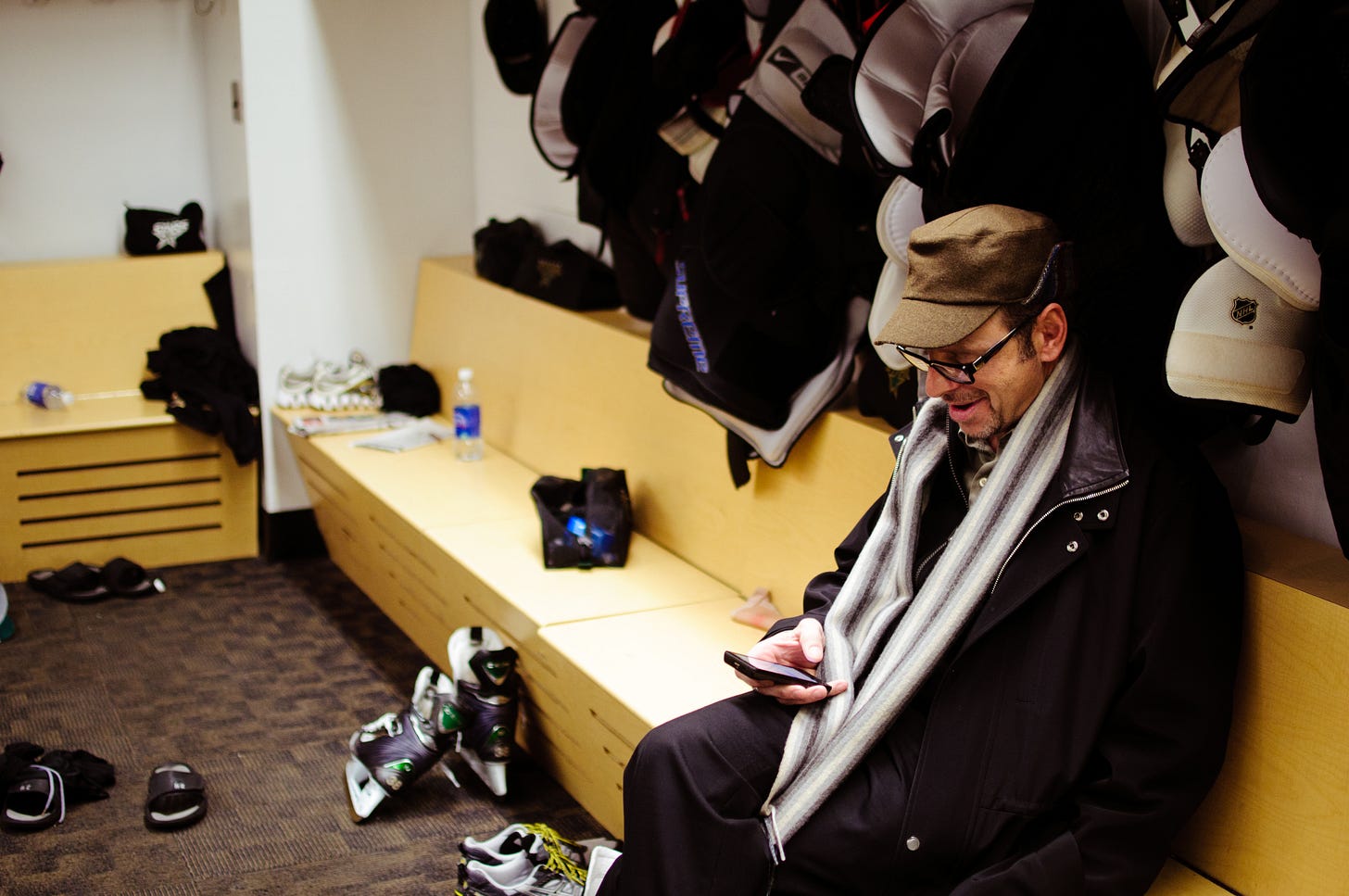
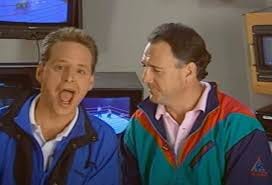


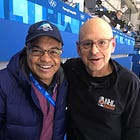
Ralph, I had a good job that I liked so I wasn’t really interested in changing. I was asked by a friend that was a coach at the high where I lived if I would call a couple of baseball/softball games for the local radio station because there regular guy was out sick. I ended up doing a dozen or so games and really enjoyed it. If I had been in my early twenties I would have loved to do it as a full time job. The station and the coaches must have liked me because I finished the season after the other guy got well. It was very easy to tell by listening to your broadcasts that you were not only good but you put in the time to know all of the details for each and every broadcast no matter the teams the Stars were playing. It really gives us a insight to Ralphie Strangis.
This is a great read, as a sports radio producer i totally understand the grind of moving up the food chain in sports media